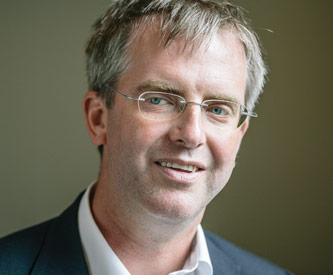Four Questions With Drew Endy, Stanford Bioengineer
Drew Endy ’92 ’94G, Stanford bioengineer, has redesigned geonomes and invented the transcriptor, a DNA element that allows living cells to implement Boolean logic. He returned to Lehigh in September as a Howard Hughes scholar.
1. You studied civil engineering at Lehigh and later helped found Stanford’s bioengineering program. What is the connection?
I like to build things. Biology is the ultimate platform for building. Biological materials can make stuff unbelievably well. Trees organize atoms from the atmosphere with a breathtaking nanoprecision. Sponges grow glass spindles that are very similar to fiber optic cables. Nanotechnology once caused people to worry that gray goo would cover the planet. That was wrong. Nanotechnology has already overtaken the planet—in the form of the green goo of biological material.
2. How did Lehigh prepare you to make the transition from civil to bioengineering?
Historically, civil engineering was defined as civilian as opposed to military engineering. Civil also refers to civilization. Do civilizations consist only of roads, water supplies, buildings? No. They also include the social contract, law, traditions, political institutions. At Lehigh, I explored the natural sciences, humanities, philosophy, political science. I struggled with genetics and biochemistry, but they reconnected me to biology as the science of living matter, which is important to engineers who want to make things.
3. What is it like to return to Lehigh after 20 years?
Many things are impressively updated, but the land along the Lehigh River has become a massive, underutilized site. It could become a major bio-based manufacturing corridor. It lies next to a major university with leading scientific, engineering and political thinkers. Combined with other elements of Lehigh, you could nucleate and lead a renewal of our society. This should be done here because of the Lehigh River and the tradition of manufacturing and the excellence of engineering, coupled with the fundamental sciences at Lehigh.
4. What should bioengineering contribute to the 21st century?
We have a chance, via biology and biotechnology, to reinvent how civilization works and to do so in ways that allow humanity and nature to flourish in partnership—to reduce energy and environmental loads, to defend natural biodiversity, and so on. But biology and biotechnology are too important to be left to scientists and engineers alone. I’d like to see a Renaissance of science and engineering that enables people, as citizens and not just consumers, to play a role in deciding what kind of world we wish for.
Photo by Christa Neu
Posted on:


